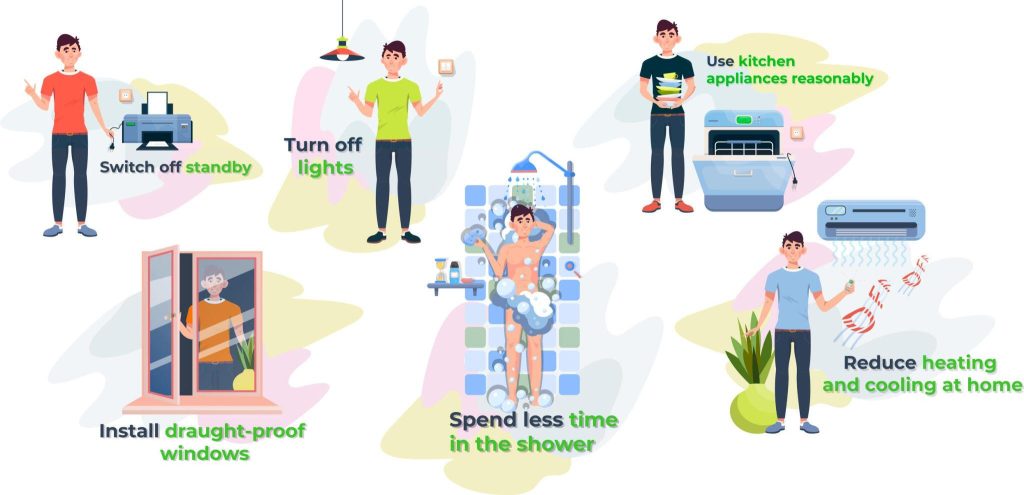At a glance
- Learn energy-saving tips tailored to your location in VIC, QLD, NSW, SA, or ACT.
- Embrace smart home technology for remote energy management and security.
- Compare regional energy options to optimise efficiency and reduce costs.
Hey there, jet-setter! Planning your next adventure?
Whether you’re off to soak up the sun in Queensland or explore the beauty of Victoria, there’s one thing you shouldn’t overlook: your home’s energy usage while you’re away.
Nobody wants to return from a blissful vacation to a sky-high energy bill. But fear not! With these simple tricks, you can keep your home energy-efficient.
Don’t let expensive energy bills kill your post-vacation bliss! Let’s dive into some smart energy-saving practices for your home during travels!
Energy Saving Tips To Save Energy at Home While You Travel
Adjust the Thermostat Temperature
Why bother heating or cooling your place when you’re not even there to feel it?
If you have a fancy thermostat you can program, just tweak the settings before you head out.
For summer trips, set the furnace to a lower temperature and crank up the AC. That way, they won’t kick in until you’re back home.
Program your thermostat to turn on right before you get back. Come home to a cool house without paying for your air conditioner the entire time.
Unplug Devices and Appliances
Walk through your home one final time before leaving to ensure you don’t forget anything. Double-check and unplug any electronic devices or appliances that won’t need power while away.
A common misconception is if an appliance or device is turned off, it doesn’t use energy. So, when we talk about unplugging the device, you need to take the connector out of the outlet.
However, even when your gadgets are turned off, they’re still sipping energy if they’re plugged in. So, to cut off the power flow, give those plugs a tug and unplug them entirely. This is one of the best ways to save energy and can provide a 10% energy saving for most households.
If you are anything like me, this won’t be enough. Make sure you take pictures of the unplugged devices to put your mind at ease.
Adjust your Refrigerator’s Temperature
Make sure you clean your refrigerator out before leaving for your vacation. This will help prevent bad smells from taking over your home. Once you’re done cleaning out your refrigerator and freezer, prop the doors open.
Fill a dish with baking soda and place it on each section. This trick will help fight bad smells and prevent mildew from building up. It is a win-win solution for you and your lovely house.
Turn off the Hot Water Heater For Energy Savings
You won’t be indulging in any cosy baths or refreshing showers at home.
So, why leave the hot water system or heater on?
It may seem harmless, but water heaters can waste a lot of energy even when not in use. They are also called standby losses.
Moreover, it will occur the entire time you’re on vacation if you don’t take the necessary steps.
Use Programmable Lights For Less Energy Use
You might decide to leave lights on as a tactic to scare off intruders, giving an impression that you’re home when they’re not. However, this is a big waste.
You do not have to choose between security and sustainability. Just install programmable lights in your home instead of standard lights. Set the lights to power on when the sun is setting. By doing this, you can keep your home secure while also saving energy.
Also, investing in cameras and sensors can help you enjoy your vacation and reduce energy use of leaving lights on.
Close Your Curtains
Before you jet off, take a stroll through your home and close all curtains and blinds. You might wonder why this matters if the air conditioner is off while you’re away.
But think about it: when you return from your trip, exhausted but eager to cool down, you’ll likely crank up the AC immediately.
The hotter it is inside your house, the harder your AC has to work to chill things out, using up more energy.
Change the Pool Filter’s Schedule
Got a pool in your backyard? Before you take off for vacation, tweak your pool filter’s schedule.
You don’t need it running full blast while you’re away, but you still want to keep the water clean. So, instead of shutting it down completely, dial back the schedule to four or five hours daily.
That’s plenty to keep things sparkling without wasting energy.
And hey, you might even find this new schedule works just fine when you’re back home too!
Embrace Smart Home Technology To Save Money and Energy
Investing in smart home technology can revolutionise how you manage your energy usage, even while you’re away.
Devices like programmable thermostats and smart plugs enable remote monitoring and control of energy usage. Hence, allowing you to adjust settings and turn off devices from anywhere in the world.
With these smart solutions, you can ensure that your home remains energy-efficient and secure, regardless of location.
By staying informed about your energy usage, you can make more informed decisions and take proactive steps to reduce waste and save money.
Enjoy Peace of Mind
Adopting these efficient energy-saving practices and embracing smart home technology, homeowners can enjoy peace of mind. You are environmentally responsible and cost-effective, even when travelling.
So, invest in smart solutions, implement energy-saving practices, and travel with confidence, knowing that your home is in good hands.
Compare Home Energy Options in Your Location
It’s essential to consider the specific factors and options available in your location to optimise your energy consumption. Different regions have varying energy sources, pricing structures, and regulations. Which, in turn, impacts the effectiveness of energy-saving practices.
Make informed decisions to maximise efficiency and minimise costs by comparing home energy options.
For example, in Victoria (VIC), homeowners may have access to renewable energy incentives and programs. Additionally, reducing carbon emissions is easier with solar panel installations and battery storage solutions.
Residents can harness clean energy and lower their reliance on traditional grid power.
In Queensland (QLD), the climate tends to be warmer. Hence, energy-saving strategies may focus on efficient air conditioning and solar power generation. With abundant sunlight, QLD residents can take advantage of solar energy systems. This helps offset electricity consumption and reduce their environmental footprint.
New South Wales (NSW) residents might benefit from energy efficiency rebates and initiatives targeting household energy usage.
In South Australia (SA), energy costs can fluctuate. Thus, residents may explore time-of-use pricing plans and demand management strategies to reduce peak electricity demand.
SA homeowners can lower their overall energy expenses by shifting energy-intensive tasks to off-peak hours and investing in energy storage solutions.
Similarly, residents of the Australian Capital Territory (ACT) can explore government-sponsored energy efficiency programs and incentives to improve home energy performance.
By comparing residential energy, you can tailor energy-saving practices to suit your specific needs and circumstances. Whether you’re in VIC, QLD, NSW, SA, or the ACT, understanding local energy dynamics empowers you to make smarter choices.
So, there you have it: efficient energy-saving practices for your home while you’re off on your adventures. Whether you’re exploring the beaches of QLD or the mountains of VIC, these tips will help you save energy and money.
Remember, a little preparation goes a long way in ensuring your home stays energy-efficient. Especially when you’re not there. So, pack your bags, hit the road, and enjoy your trip without worrying about wasted energy back home!
-
Comprehensive insights into the energy bill relief fund in Australia
5 May 2024
Energy
-
Find the best electricity deal for electric vehicle charging
28 April 2024
Gas & Electricity
-
Understanding energy demand charges: A guide for business owners
25 April 2024
Energy


